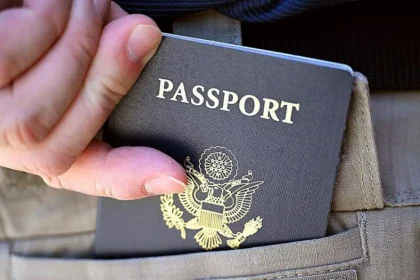When Niharika Handa first surfaced in Ghana’s business circles, she projected the image of a respectable investor. She held a Ghanaian passport, operated businesses, and moved with the confidence of someone who had earned a legitimate place in the country. Yet beneath this veneer of legitimacy, investigators say, lies a trail of deception that stretches across several countries and raises troubling questions about the integrity of Ghana’s citizenship system.
Fresh evidence now suggests that Ms. Handa, who allegedly acquired Ghanaian citizenship without satisfying key immigration requirements, may also have been engaged in identity fraud not just in Ghana, but in India, Dubai, Austria, and the United Kingdom.
The suspicious path to citizenship
Concerns about Ms. Handa’s naturalisation first emerged when it was discovered that she and her son, Vasu Handa, obtained Ghanaian passports after residing in the country for fewer years than the mandatory seven-year requirement. Even more puzzling was a glaring discrepancy in her documents: her Indian passport lists her date of birth as September 14, 1961, while her Ghanaian passport, issued in 2022, records it as September 14, 1965.
When media reports raised questions about this inconsistency, her lawyer, Thaddeus Sory, dismissed it as “obviously a clerical error.” But if it was indeed an error, why has Ms. Handa done little to correct it?
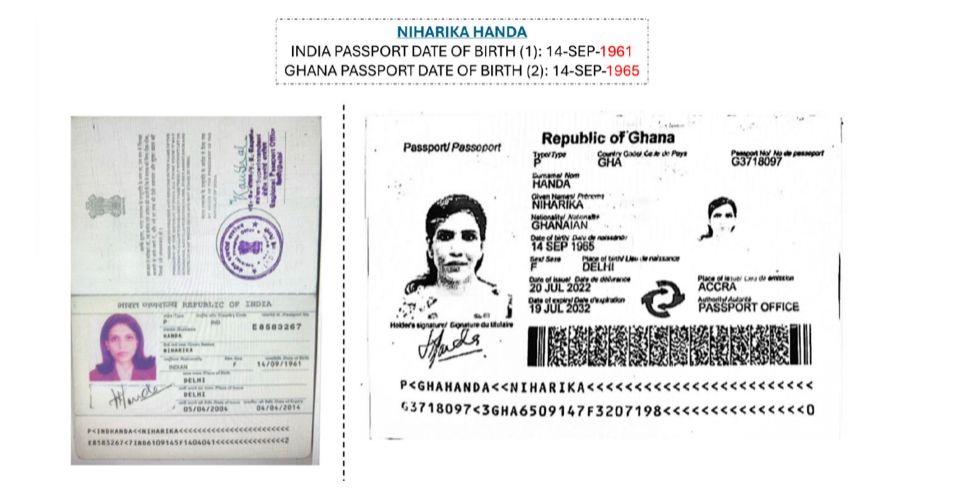
GhanaCard and passport issued within days
New revelations have only deepened the mystery. On July 8, 2022, Ms. Handa obtained a GhanaCard reflecting the disputed 1965 birth year. Less than two weeks later, on July 20, 2022, she was issued a Ghanaian passport carrying the exact same year. Two separate state institutions therefore recorded the same date yet her lawyer maintains it was a simple clerical error. The sequence of events raises an uncomfortable question: if there was no intent to deceive, why was there no attempt to rectify the record at the time of issuance?
Instead of correcting the alleged mistake, Ms. Handa has embraced it. She has used her Ghanaian passport extensively to travel internationally, securing visas to the UK, Schengen countries, Dubai, and Morocco. She has also opened bank accounts and established businesses in Ghana, Austria, and the UK.
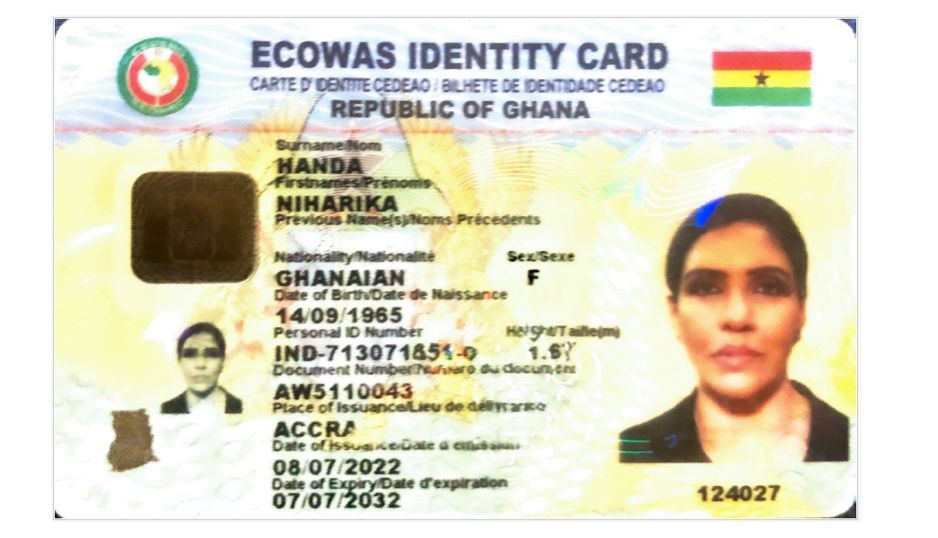
At the Registrar-General’s Department, she amended records for companies she is connected to, including Gold Crest Refinery, by replacing her earlier date of birth (1961, from her Indian passport) with the disputed 1965 date from her Ghanaian passport. For investigators, the pattern of conduct makes it increasingly difficult to accept the “clerical error” explanation.
A tangled web of dates of birth
Probing deeper into Ms. Handa’s background, investigators found an even more tangled web of identities. In India, her taxpayer identification card (PAN) and driver’s licence both list her birth year as 1964. That means she is officially recorded with three different years of birth: 1961, 1964, and 1965.
Evidence shows she has used these different birth years to open bank accounts and establish companies in multiple jurisdictions. “Which is Ms. Handa’s real date of birth?” one investigator asked. “That remains a mystery. What is clear is that these inconsistencies cannot be explained away as a mere clerical slip.”
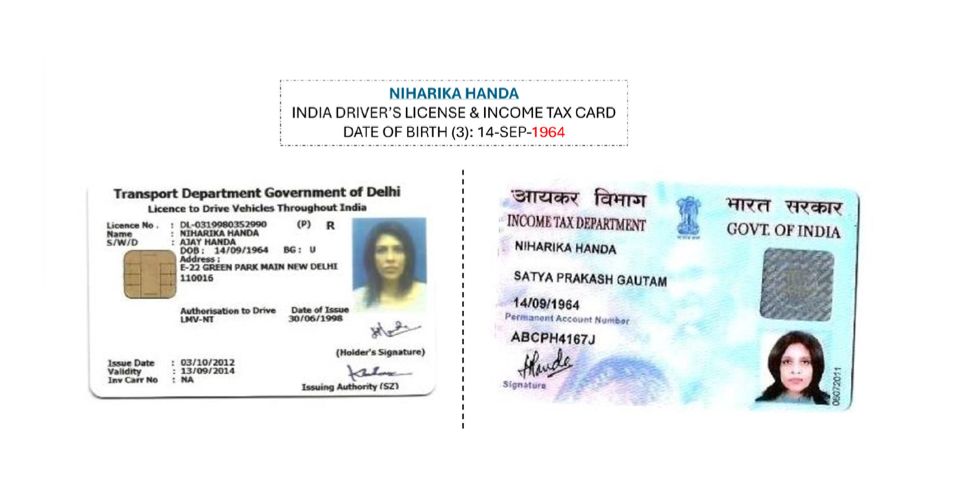
The findings are particularly alarming given her legal history. In India, she faced 14 non-bailable arrest warrants and was declared an absconder and proclaimed offender on charges of cheating and defrauding. These cases were active before, during, and after her acquisition of Ghanaian citizenship.
“If a respected member of Ghana’s legal fraternity insists this is merely a clerical error, then as a country we must ask ourselves where we are heading,” an intelligence source said. “These discrepancies in birth dates clearly point to an attempt to deceive authorities globally and make it difficult for them to track down Niharika Handa. Far from a clerical error, this is a calculated deception for the purpose of hiding her criminal background, which is something the immigration authorities should have investigated before granting her citizenship in a short time.”
The son’s parallel trail
The trail of questionable documents does not end with Ms. Handa. Her son, Punar Vasu Handa, has also been linked to similar inconsistencies. His Ghanaian passport lists his date of birth as December 7, 1985, while his Indian PAN card records it as February 7, 1985.
Before traveling from India to Dubai in 2015, he reportedly obtained a new passport that listed his birthday as December 7, 1985, claiming that his original passport had been lost. Investigators suspect the original carried the date on his PAN card. By adjusting his date of birth, he may have sought to bypass Indian immigration checks.
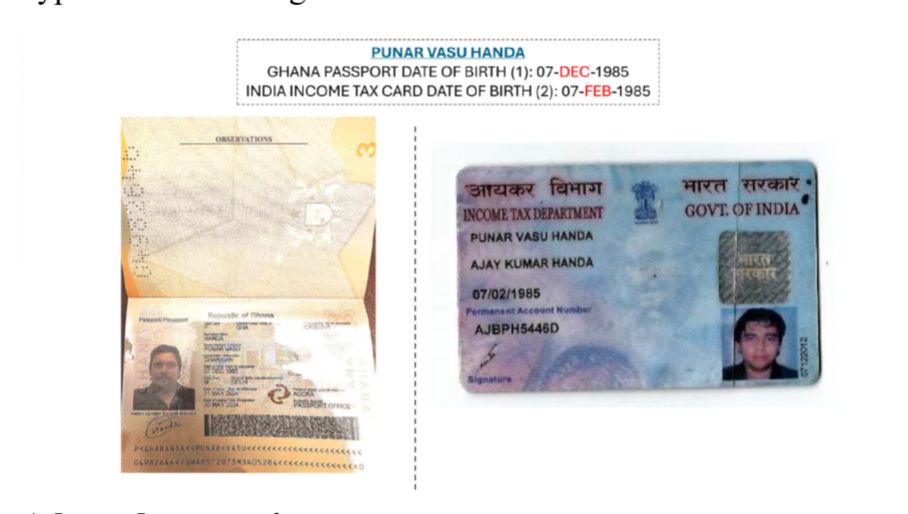
A broader warning
“This points to an identity fraud of international magnitude perpetrated by this woman and her son,” the intelligence source said. “Identity fraud is often the foundation of financial fraud. Normally, individuals do not alter their personal details; it is only when there is intent to deceive or to defraud that such manipulation is undertaken to bypass system checks.”
The source warned that Ghana must act decisively. “To prevent such dubious foreigners from exploiting Ghana’s systems, immigration authorities must insist on police clearance reports from applicants’ home countries before issuing residence permits. For the granting of Ghanaian citizenship, far more thorough background checks by immigration authorities are essential. Fraudsters gaining Ghanaian citizenship directly undermines the reputation of Ghana’s passport and the relaxed visa regimes it currently enjoys with certain countries. At the same time, Ghana must confront the growing nexus between criminals and those tasked with upholding or defending the law.”
The stakes for Ghana
The case of Niharika Handa and her son is a test of Ghana’s ability to protect the integrity of its institutions, its passport, and its global reputation. If the allegations stand, the implications are stark: citizenship (a mark of national trust) can be stolen, manipulated, and sold. And if that trust is eroded, then the value of the Ghanaian passport, and the credibility of the state itself, will not be far behind.





